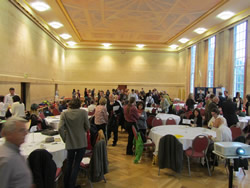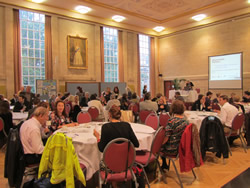SHINE aims to make it easy to stay healthy in Bristol
The Supporting Healthy Inclusive Neighbourhood Environments Health Integration Team (SHINE HIT) launched on Thursday 26 September. Chairing the event, Angela Raffle explained: “We want to make Bristol a place where it’s easy to stay healthy.”
- 27th September 2013

The Supporting Healthy Inclusive Neighbourhood Environments Health Integration Team (SHINE HIT) launched on Thursday 26 September. Chairing the event, Angela Raffle explained: “We want to make Bristol a place where it’s easy to stay healthy.” Angela, who is a public health consultant at Bristol City Council, described how the SHINE team was unique to Bristol: nowhere else are academics, local government and health practitioners working together to make the urban environment healthier in this way.
The SHINE HIT was launched at a conference where more than 100 people came together to talk about health, the built environment and urban green spaces. The event, held at Bristol City Hall, saw academics, community leaders, politicians, healthcare practitioners and the public come together to share ideas.

SHINE Directors Suzanne Audrey, Research Fellow at the University of Bristol, and Marcus Grant, Associate Professor of Healthy Urban Environments, UWE, talked about why SHINE was needed. “How often are regeneration, new developments, or city planning scoped for health?” asked Marcus. He described how many of the new developments on the edge of Bristol have been developed around cars rather than people.
Marcus also described some of the work SHINE participants were already doing, such as Adrian Davis’s evidence reviews to inform transport policy.
“The environment should support people in helping themselves to stay healthy”, said Suzanne, going on to explain that often the evidence linking urban development and health doesn’t exist or isn’t sufficiently joined up to influence policy makers. She suggested that there were important opportunities to test the impact of changes to the urban environment on local people, including neighbourhood planning areas at Lockleaze, Old Market, Redcliffe, Lawrence Weston and Knowle West and developments at the local enterprise zone near Temple Meads station.
A question from the floor challenged whether more evidence gathering could stand in the way of actually taking action. But Marcus said that “SHINE wants to accelerate implementation, not hold it back for lack of evaluation”. Angela praised UWE and the University of Bristol for taking local action: often academia focuses on the international arena but doesn’t get involved in issues on its own doorstep.The keynote address came from Catharine Ward-Thompson, Professor of Landscape Architecture at the University of Edinburgh. She talked about a project that looked at the barriers that older people face in getting outdoors, and how more inclusive urban design could address these barriers. Through qualitative research, asking older people what’s important to them, the study showed simple things like plain, smooth paving, separate from cyclists and clear of obstructions, could make a lot of difference.
The study looked at the DIY Streets initiative, and showed that it had short term benefits for residents, especially in making them feel safer and more able to go out. However, in the longer-term, the initiative didn’t have a major impact on social engagement, well-being or quality of life for older people. Only larger, strategic, more sustained development projects were likely to have longer-term positive impacts.
Catharine also discussed the vital role that green spaces play in people’s well-being. Older people living 10 minutes or less walking distance from a local open space were twice as likely to do the two and a half hours walking a week which is considered healthy. Download Catharine’s full presentation (PDF).
The keynote address was followed by marketplace sessions, where delegates could choose to join smaller groups to discuss issues such as social isolation, child injury, healthy aging, sustainable transport and food.
Summing up, SHINE Director Adrian Davis from Bristol City Council said that the event showed that there was obviously “overwhelming enthusiasm for taking forward the ambitions of SHINE and building on everyone’s expertise”.






